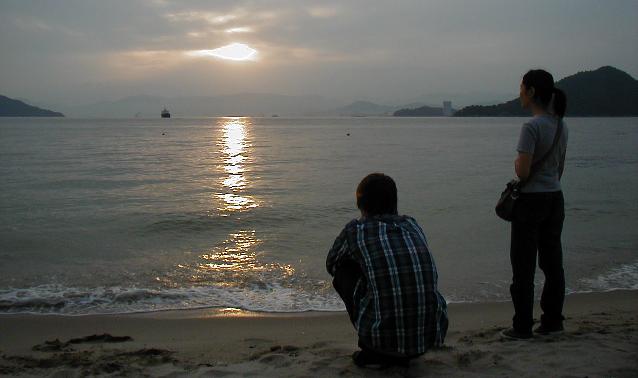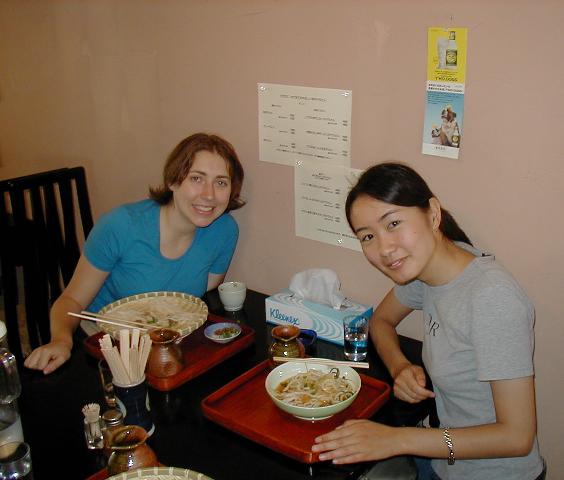
the Secret of Slurping (水尻) |
Hiroshima is a port town, to say nothing of the fact that Japan is a sting of islands, and I have only been to the ocean here one time. How silly! Therefore it was something of an obligation to get to the ocean for a daytrip. Nay, I daresay a quest! (A...Seaquest? no no. Roy Schieder was nowhere to be seen).
After weeks of trying to get a group of people together for this daytrip (which is nearly an impossible thing in Japan, even on weekends), Cary, Kana and I said we would go. Now, where was the ocean? How do three people with no car get there? When I lived in Kure, a long long time ago, I would sit on the train and stare blankly out the window, and there was one stop in particular that I remembered. It was a stretch of beach, sand and water, just beyond the train platform, with hardly any people around (well, it was winter). 水(mizu=water) was the first kanji, but I couldnt remember the rest. Water --> Ocean, it wasnt hard to remember. So with me as a quasi-navigator, everyone got on the train and we saw a stop that said 水尻(mizushiri) and I knew that was it. It's hard to believe that a 20 minute trainride away from downtown is a beach. But there it was.

| Kana and Cary started laughing at the kanji. I am not too quick on this stuff so I asked what was so funny. Cary asked me if I knew the meaning of shiri, which how could I not (it refers to a person's "butt"). But I figured, that being a stupid name for a town or trainstop, "water bottom" or "butt water" would have to be an incorrect translation. After all, many kanji have several different meanings. Nope. We were at Butt-Water Beach. The name itself provided minutes of entertainment. Who would name something Butt-Water?? We walked up and down the highway that seperated the trainstop (no station, just the platform and a ticket vending machine) and the beach. There were factories as far as the eye could see, and we walked for about ten minutes or so. But finally we came upon an udon-ya and had some noodles. The sweet auntie that made our udon told us the secret of slurping. Foreigners do not generally expect there to be any meaning behind the slurping noise that asians do not mask when eating any noodley food. But there is. Someone once explained in a movie that it was "polite." Why would slurping be polite? What meaning does it have? A very logical one actually. The auntie at the udon-ya told us. A noodle-vendor will know right away when someone likes there noodles (excluding foreigners). By the slurping sound. Rather than trying to be quiet about eating, as is commonpractice in the west, the slurping noise indicates they like the taste. Why? You grab the noodles with the chopsticks and the sauce or broth will run down the noodles back into the bowl, leaving you only a fraction of the taste. You eat the noodles, with a little bit of flavor, the rest of the flavor ends up in the bowl which you could drink afterwards, but then the flavor isnt combined with the noodles. By slurping you get more of the flavor with the noodles. Therefore, slurping would tell a vendor you like the taste. 以上 |  |
We walked back up the highway after our lunch and got to the beach at last. There were children playing, couples sitting on the walkway, an old man in a fishing boat. The sun was already low in the sky when we got there, but we chatted, played catch, skipped rocks, and stared at the water (which was cold, very cold). We didnt stay too long, and we didnt do much of anything noteworthy, I guess. But we were all glad to go. Even when we werent saying anything, we are glad to just be there, out in the open, watching the waves, and enjoying eachothers company. Its getting painfully obvious that we're only going to be together for a short time yet. We're trying to do these things while we can.